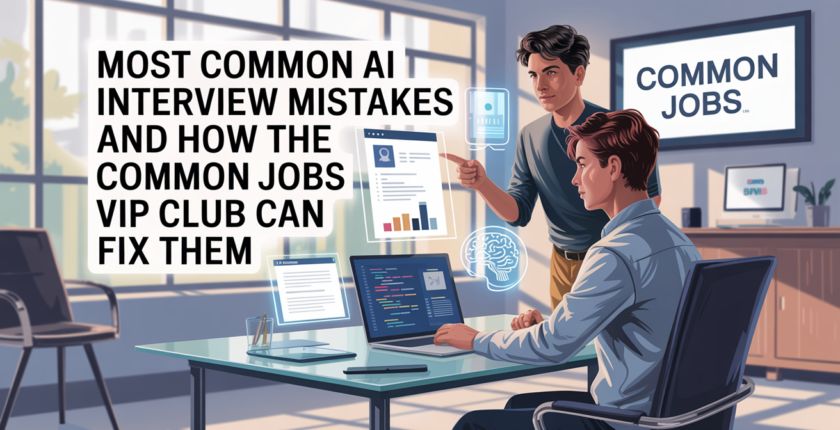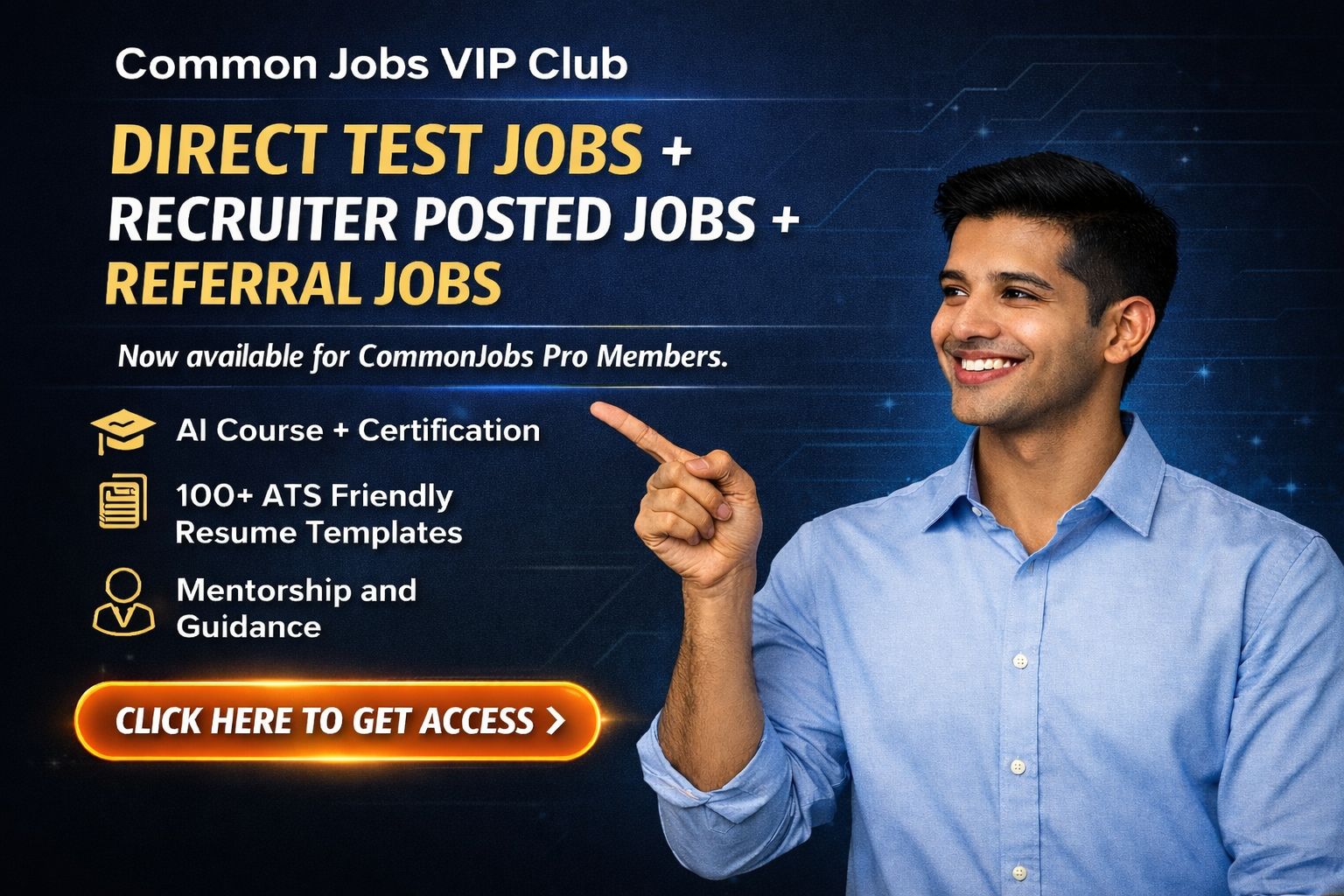Most Common AI Interview Mistakes Freshers Make And How the Common Jobs VIP Club Helps You Avoid Them
Most Common AI Interview Mistakes Freshers Make : It’s thrilling to land your first job in AI or a similar industry, but it can also be nerve-racking. Recruiters demand more than just technical expertise, the competition is intense, and the interview process is regimented. For newcomers to the artificial intelligence field, how well they handle the interview process—rather than just their abilities—often determines whether they are hired or not.
Building a model, writing code, or earning a certification is one thing; speaking eloquently about your project, outlining your ideas, and proving your influence during a structured interview is quite another. Many new hires fall into one of the following traps: general comments that don’t fit the work, unclear answers, a lack of project depth, or inadequate articulation of their contributions. This is particularly true during AI job rounds, when questions can be algorithmic, project-based, logical, or behavioral.
The CommonJobs VIP Club really helps in this situation. In addition to providing access to an AI course, career recommendations, and HR contacts, the VIP Club offers help with interview preparation, resume review sessions, and practical project advice. This post will discuss the most typical AI interview blunders made by new applicants, the reasons behind them, and how joining the VIP Club will help you steer clear of them and position yourself for success.
Top 10 AI Projects to Showcase in Your Portfolio Built Easily with the CommonJobs AI Course
Not Being Able to Clearly Explain Your Project
Many freshers build one or two projects during their studies or certification, but when asked in an interview, they struggle to articulate what they did, why they did it, and how it added value. They might say, “I built a chatbot” but then fail to explain the business problem the bot solved, the approach they took, or the metrics they improved. Interviewers often hear generic statements like “I used Python and TensorFlow” without concrete detail.
Because AI roles are highly practical, recruiters expect you to discuss: the data you used, how you cleaned it, which algorithm you selected (and why), how you evaluated it, what challenges you encountered, and the outcome (accuracy, insights, deployment). Without that storytelling, your project stays in the “academic exercise” category and doesn’t translate into “I added value.”
How the VIP Club fixes this: The CommonJobs VIP Club’s AI course includes structured modules that teach not only how to build projects, but how to document and present them in interview-ready form. You’ll receive guidance on building project portfolios with clear problem statements, data pipeline descriptions, algorithm choice rationale, evaluation results, and deployment outcomes. Additionally, the VIP plan offers personal resume review sessions where mentors help you sharpen how your projects are described and prepare elevator pitches for interviews. This means when you’re asked “Tell me about your project,” you respond with clarity, relevance, and impact—not hesitation.
Lack of Understanding of Model Performance and Metrics
A frequent error freshers make is knowing the code, but not the why behind the results. For example, you might have built a classification model that achieved 80 % accuracy, but when asked “Why accuracy isn’t always enough” or “What’s precision vs recall” you’re unable to answer. Or perhaps you used cross-validation but can’t clearly explain what it achieved or why it matters. In AI interviews, understanding these evaluation metrics is crucial because they reflect your deeper comprehension of trade-offs and model reliability.
Moreover, many freshers neglect to talk about model deployment, monitoring, and how the model will operate in a production environment. Interviewers often ask follow-up questions like, “What would you monitor post-deployment? How would you handle concept drift?” Without preparedness, candidates stumble and lose points even if their model technically works.
How the VIP Club fixes this: Within the VIP Club’s AI course, dedicated modules cover model evaluation, metrics, deployment basics, monitoring, bias detection, and ethical considerations. You’ll work through guided exercises explaining confusion matrices, ROC-AUC, F1-score, false positives/negatives, model drift, and real-world impact. During mentorship sessions, you’ll rehearse how to answer common metric and deployment questions. This helps you present a complete story—not just “I built it,” but “I evaluated it, deployed it, and I know how it performs in real life.” That readiness boosts your confidence and credibility in interviews.
Over-Focusing on Theory and Under-Showing Practical Skills
Freshers often believe that if they memorize algorithms (like k-means, SVM, decision trees, neural networks) they’ll be safe. But interviewers increasingly prefer candidates who can apply algorithms, explain trade-offs, and pick the right tool for the job—not recite definitions. If your answers are limited to “I know neural networks” or “I used backpropagation,” without showing the actual project, choice, results, and constraints, you may lose the recruiter’s interest.
Additionally, many freshers avoid using no-code tools or automation platforms because they feel “less technical.” But in 2025’s job market, being able to show you used AI tools, prompt engineering, no-code platforms, and integration with real workflows is a plus. Employers value candidates who can deliver results quickly and adapt to modern tech stacks.
How the VIP Club fixes this: The CommonJobs VIP Club offers a hands-on AI course designed for beginners, covering both manual implementation and no-code/low-code AI toolsets. You’ll build practical projects (as described in the course modules) and document each step from data to deployment. Mentors help you highlight which tools you used, why you selected them, what you learned, and how you’d apply them in a job role. By showcasing both theory and practice, you’ll be ready to engage interviewers with a balanced and actionable skill set.
Poor Interview Readiness—Soft Skills & Communication Gaps
Technical preparation aside, many freshers underestimate how much communication and soft skills matter. In AI interviews, you’re often asked to walk through your project, explain your thought process, and answer behavioural questions like “Tell me about a time you failed,” or “How did you collaborate with a team?” If you’re unprepared, you may give incoherent or fragmented answers—even with good technical skills.
Another common error is not preparing for job-relevant questions like “Why do you want to work in AI?” or “What makes you a good fit for this role?” Without concise, confident responses, you risk being seen as unprepared. Freshers also tend to stumble on scenario-based questions where they have to explain how they’d handle real-world constraints, deadlines, or changing requirements.
How the VIP Club fixes this: The VIP plan includes interview preparation modules, soft-skills training, and personalized one-on-one resume review sessions. Through mock interview sessions or preparation prompts, you’ll practise articulating your projects, reasoning behind decisions, and collaboration/case-study responses. You’ll also receive feedback on your communication clarity, body language tips, and how to create structured answers using the STAR method (Situation, Task, Action, Result). This helps transform your preparation from “just knowing tech” to “being ready to talk about your tech with confidence.”
Neglecting Career Strategy & Job Search Planning
One of the biggest hidden mistakes is lack of strategy. Freshers often apply randomly across many roles, with generic cover letters, and wait for responses. In today’s AI-driven job market, quality over quantity wins. Without targeting roles where your skills align, tailoring your resume, and doing direct outreach, you often get overlooked. Also, not leveraging referral networks, HR contacts, or job timing can reduce inbound interview chances.
Many freshers also ignore building a portfolio website, GitHub, LinkedIn profile showing AI projects, as well as failing to stay updated with job tools or platforms that highlight AI-capable candidates. This strategic gap means your application doesn’t reach the recruiter’s radar in time or in the right way.
How the VIP Club fixes this: The CommonJobs VIP Club offers access to a verified HR email list, daily direct job updates, and templates to build referral relationships. It also guides you on how to structure your job search strategy: target companies, customize applications, build a strong LinkedIn + GitHub presence, show your AI projects, and convert your outreach into interviews. With mentorship support and resource access, you can go from “applying aimlessly” to “applying smartly and being found.”
Unique Insights & Why This Matters in 2025
- AI jobs have a different evaluation lens. Recruiters assess you not only on “Can you code?” but on “Can you build value with AI?” and “Can you explain it to someone non-technical?” If you only prepare for coding rounds, you miss half the evaluation.
- Freshers are no longer just entry-level—they’re expected to show initiative. Projects, portfolios, and demonstrations of applied AI set you apart.
- The job market is crowded. Students who follow the traditional path (degree → apply → wait) often find limited responses. Platforms like CommonJobs VIP Club are increasingly important to help you stand out and navigate this new reality.
- One small improvement can triple your opportunities. Fixing your interview preparation, strategy, or project-explanation can dramatically increase callbacks—even more than adding another certificate.
Conclusion
AI interviews can feel intimidating—but most rejections come not because you lack intelligence, but because you missed one of the key elements: clear project explanation, metric understanding, practical application, communication skills, or job strategy. The CommonJobs VIP Club addresses all these gaps. It’s not just a course—it’s a full preparation ecosystem designed for freshers to learn, build, present, and succeed.
If you’re serious about breaking into AI, don’t let one interview mistake hold you back. Join the Common Jobs VIP Club, complete your AI course, build your project portfolio, practise your interview skills, and approach your job search with strategy. Your first AI role is well within reach.



